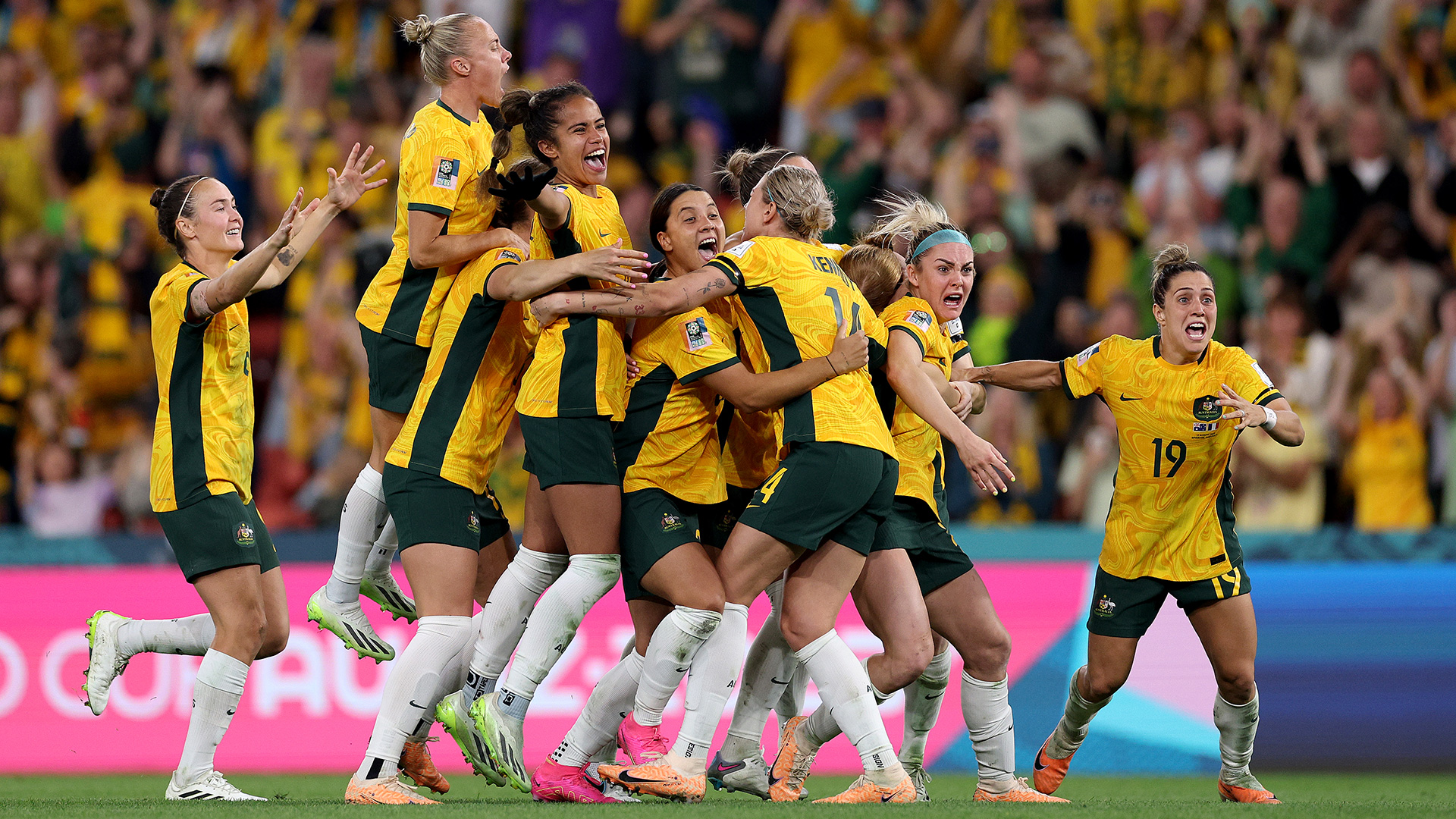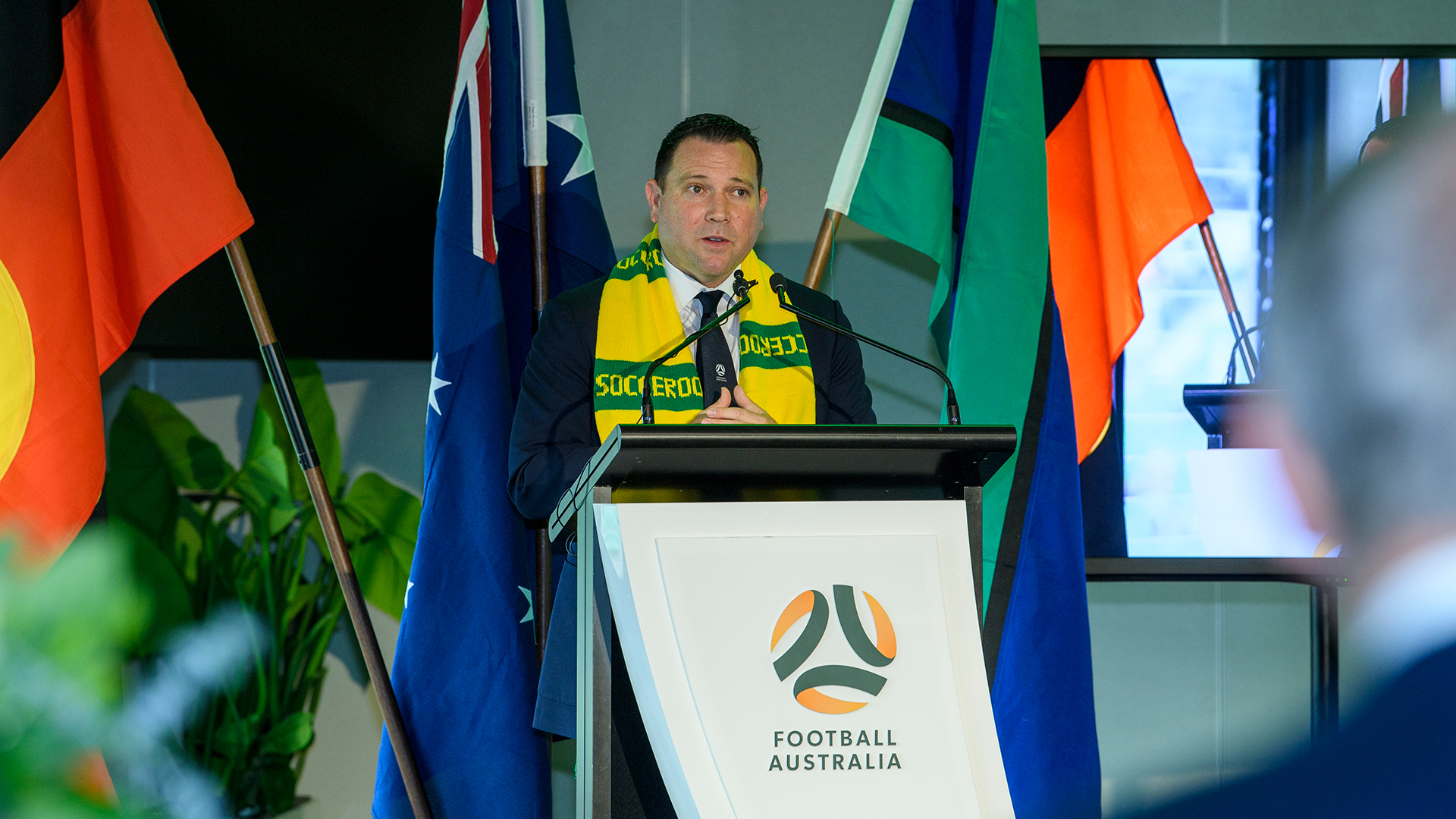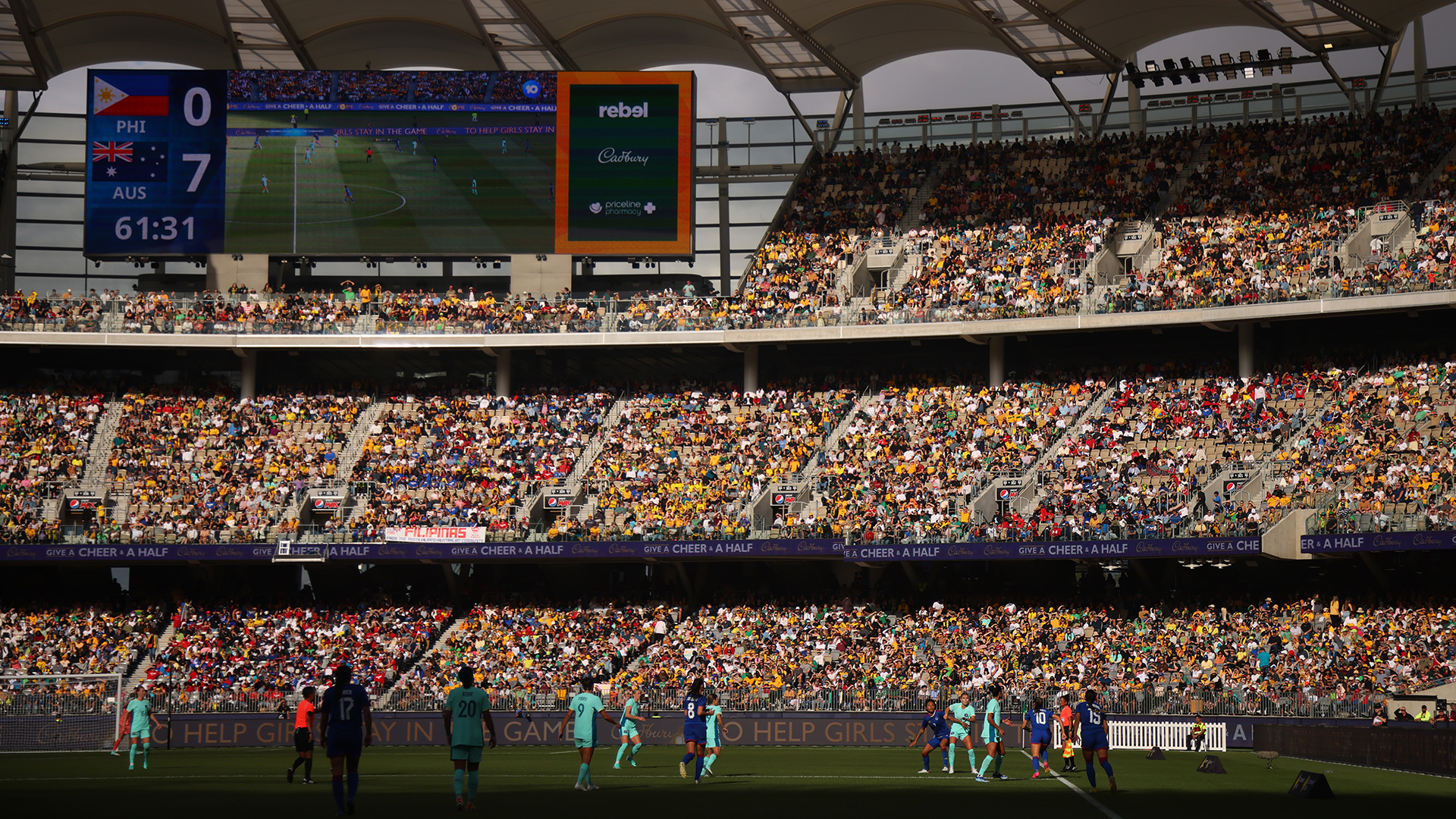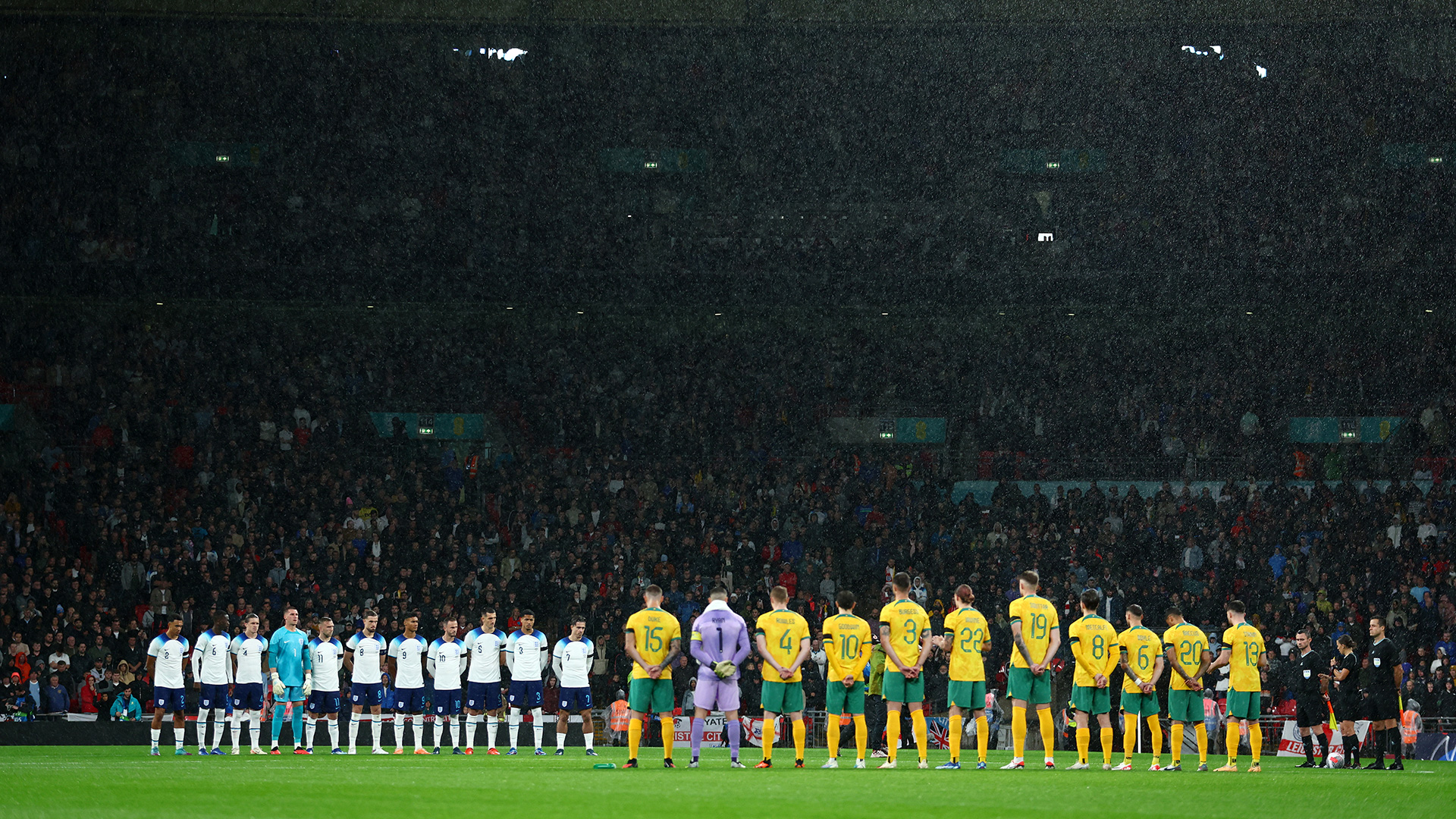In 2023, Australia welcomed the world as Football Australia hosted the FIFA Women’s World Cup Australia and New Zealand 2023™.
From 20 July to 20 August, Australia hosted 32 of the world’s best women’s national football teams, with Spain eventually crowned World Champions.
- READ MORE: Football Australia 2023 Annual Review
The CommBank Matildas created history as the team recorded its best performance at a FIFA Women’s World Cup™, reaching the Semi-Finals against England. The CommBank Matildas’ performance also represented the best performance by any Australian senior National Team at a FIFA tournament, forever writing the CommBank Matildas into the annals of Australian football folklore, alongside the likes of the ’74, ’06 and ’22 Subway Socceroos.
Australia has a long and successful history of hosting global sporting events, and the FIFA Women’s World Cup Australia and New Zealand 2023™ further enhanced Australia’s reputation as an ideal candidate to host future global football tournaments.

The tournament itself welcomed millions of people to Australia and provided a timely boost to the domestic economy as Australia continues to respond successfully to the economic impact of the COVID-19 pandemic.
When building a vision for the FIFA Women’s World Cup Australia and New Zealand 2023™, we believed that not only could Australia be a great host of global international tournaments, we also wanted to prove that people would visit to watch matches and stadiums would be full, or tune in from the largest broadcast markets throughout Asia, Europe and the United Kingdom.
Following the conclusion of the tournament, the FIFA President, Gianni Infantino, hailed it as the best edition of any FIFA Women’s World Cup™ ever, surpassing all targets, with nearly two million people attending matches (compared with 1.1 million in 2019). Australia hosted a total of 35 matches, attracting 1,269,531 spectators at an average of 36,272 per match, confirming Australia as a strong host of global football competitions.
The CommBank Matildas have done the nation proud. Australia’s seven matches during the tournament attracted 403,136 fans with an average of 57,591 attending each match, accounting for 99.92% of capacity at each venue. Their journey through the tournament captivated the nation, with matches rating an average audience of 3.44 million per match. The aggregate viewership for their Network 7 fixtures stood at a staggering 24.08 million. Optus Sport, the tournament’s host broadcaster, saw social media views of FIFA Women’s World Cup™ content exceeding 75 million. Average viewing time of content by each Optus Sport subscriber was over 21 hours and page views of content articles reached 5.5 million during a five-week period.
With a projected global reach of two billion people, the tournament successfully debunked the myth that Australia presents a difficult time zone for global viewing markets, with matches broadcast in viewer-friendly timeslots in the world’s largest markets, including China, India, the United Kingdom and the east coast of the USA.
The year 2023 marked a turning point for Australian football as the most important in the sport’s 100-year history, with the year highlighted by the Subway Socceroos’ participation at the FIFA World Cup Qatar 2022™, as well as Football Australia’s co-hosting of the FIFA Women’s World Cup Australia and New Zealand 2023™. Our participation in Qatar was the Subway Socceroos’ fifth consecutive appearance in a FIFA World Cup™, and although the team lost to eventual champions, Argentina, in a mouthwatering Round of 16 match, victories against Denmark and Tunisia in the group stages meant the Subway Socceroos recorded their highest ever finish at a FIFA World Cup™.
This new administration has led an aggressive agenda of change and transformation for Australian football. In 2020, we recognised that our upcoming participation at the FIFA World Cup Qatar 2022™ and our co-hosting of the FIFA Women’s World Cup Australia and New Zealand 2023™, presented Football Australia with an excellent opportunity to build two iconic National Team brands and connect them to the largest participation sport community in the country, to drive the growth of the game.
At the time, however, Australian football faced major challenges: the sport was divided, sponsors were leaving, and our National Teams lacked visibility. We recognised the need for a new vision and developed the XI Principles for the future of Australian football, a 15-year vision that would guide the transformation of the sport and begin the implementation of our plans to leverage these two FIFA World Cup™ tournaments, to propel Australian football into a new future.
Today, Football Australia is a drastically different organisation to the one this administration inherited, and we are delighted to report that the organisation saw a net surplus of $3.6 million and a net Members’ equity of $21.9 million in the financial year 2023, and following 24 months of strong financial performance, Football Australia is now in the healthiest financial position it has ever been.
This financial success is largely due to the popularity and success of National Teams, the Subway Socceroos and the CommBank Matildas. We are proud to have two of the most recognisable national sporting teams in Australia that inspire millions of people in Australia and around the world. Both teams have been able to successfully blend youth and experience to achieve world-class results, while also nurturing the next generation of National Team players. The results of both programs speak to the success and the health of our National Teams.
It was a stand-out year for the likes of Harry Souttar, who, after suffering a serious knee injury, returned to the Subway Socceroos squad to play a starring role at the FIFA World Cup Qatar 2022™, earning a mid-season transfer to former Premier League champions Leicester City Football Club. We have also seen Riley McGree establish himself as an important member of Championship outfit Middlesborough with key goals and assists this year after joining the club in 2022.

Our female players continue to play at some of the world’s biggest clubs, including Arsenal, Manchester City, Chelsea, Real Madrid, and Lyon. Sam Kerr, Caitlin Foord and Steph Catley continue to rank among the best players in the world, while Mary Fowler and Kyra Cooney-Cross have quickly established themselves as prodigious talents, following breakthrough performances at the FIFA Women’s World Cup Australia and New Zealand 2023™. This year was a stellar year for CommBank Matildas Captain Sam Kerr, and it would be remiss not to mention her historic achievement of placing second in the Ballon d’Or (Hayley Raso placed 17th) and also being crowned AFC’s Women’s Player of the Year.
Australian coaches are also excelling on the global stage. After two extremely successful seasons at Celtic Football Club, Ange Postecoglou secured a historic move to Tottenham Hotspur Football Club, becoming the first Australian to manage a club in the Premier League. Tanya Oxtoby, who was assistant coach of Chelsea Football Club women’s team during one of its most successful periods, became Head Coach of Northern Ireland’s women’s national team. Kevin Muscat also continues a successful period in Japan with Yokohama F. Marinos, which was crowned Japanese Super Cup winner after winning the J.League the year before.
After 12 months of increased player transfers from the A-Leagues (Men’s and Women’s) to clubs abroad, Australia is steadily establishing itself as a key producer and exporter of talent and is once again featuring on the global stage. International transfers from the A-League Men increased from 16 in the 2021/22 season to 19 in the 2022/23 season. This included significant moves for rising stars Jordan Bos (Melbourne City to Westerlo, Belgium), Nectarios Triantis (Central Coast Mariners to Sunderland FC, England), and Marco Tilio (Melbourne City to Celtic FC, Scotland). Middlesborough FC recently signed Tom Glover and Samuel Silvera, where they will join fellow Subway Socceroo Riley McGree, and Aiden O’Neill joined Belgian Pro-League side Standard Liege. In a new Australian record for an international transfer, Nestory Irankunda has also signed a deal with football giants FC Bayern Munich.
Domestically, the game has never been in a stronger position. Through our Legacy ’23 plan, which we launched at Parliament House in Canberra, in February 2021, football – and more specifically, women’s football – has unlocked more than $389 million in federal and state government funding towards Legacy ‘23-related projects as published in our pre-tournament Legacy ‘23 report in August 2023. A large portion of these funds has been allocated to projects primarily focused on reshaping the game for the benefit of women and girls.
This investment has already made an impact as we seek to achieve 50:50 gender participation by 2027, with overall female participation increasing from 22% to 26%.
Considerable investment into community facilities has also improved the Community Club environment for women and girls, with the number of clubs considered ‘inclusive’ increasing from 36% to 40%.
In a significant moment for Australian women’s sport, the Federal Government also committed a further $200 million to fund the improvement of sporting facilities and equipment specifically for women, when it announced its groundbreaking initiative, the Play Our Way program. This commitment was in response to the extraordinary success of our co-hosting the FIFA Women’s World Cup Australia and New Zealand 2023™, and the rise in female participation in community sport.
To complement this, together with Commonwealth Bank, we have launched the Growing Football Fund, to support the continued growth of women’s football across Australia. The community fund will focus on two primary pillars of coaching and participation, with the goal of attracting and retaining more women and girls in football. To further support the growth and development for women and girls in football, Clubs and Associations can apply for a grant of up to $5,000 to use towards key initiatives for the 2024 season.
Before the end of the calendar year, Football Australia will publish a final Legacy ’23 report, which will highlight the overall impact of our co-hosting the FIFA Women’s World Cup Australia and New Zealand 2023™. We believe co-hosting such an important women’s football event has contributed to greater visibility and inclusion for women and girls in our sport.
Although football remains the number one participation sport in the country, we continue to work to consolidate this position. Following the FIFA World Cup Qatar 2022™ and the coordinated and bespoke marketing campaign with our Member Federations to drive participation in the lead-up to the tournament, we have experienced a 10% increase in our participation numbers. We are anticipating further growth in 2024 thanks to our successful co-hosting of the FIFA Women’s World Cup Australia and New Zealand 2023™.
Change is never easy and it is fair to say Australian football has encountered many challenges. Amid these challenges, however, we have experienced numerous successes during the four years this administration has been charged with the responsibility of leading Australian football.
Establishing and then pursuing a clear vision has been crucial to the success of the organisation. In 2020, the COVID-19 pandemic brought widespread disruption to everyday activities, and the impact on our game was very damaging.
At Football Australia we recognised that Australian football would need to recover and chart a new course towards a renewed vision for the game: one that would both unite and inspire us. We established the XI Principles for the future of Australian football (XI Principles), a 15-year vision for the game, which articulates a new strategic agenda for the future for Australian football and the 11 principles that will guide Football Australia to realising that ambition. Since its inception, the XI Principles have acted as a ‘north star’ for Australian football, proving to be a cornerstone in decision-making, and helping bring certainty to an unpredictable future.
The XI Principles have served as a unifying force, allowing us to rally together and create a ‘calling card that announces to the rest of the world who we are and what we stand for’. It was this clear vision that significantly contributed to Football Australia winning the right to co-host the FIFA Women’s World Cup Australia and New Zealand 2023™ and to ‘shape the competition’, so that it became a marker and a reference point for generations to come, rather than just a football tournament.
To ensure Football Australia was able to move the sport towards the future envisioned within the XI Principles, we needed to create the right conditions for success, and ensure the transformation of the organisation into a modern structure that was fit for purpose and able to align with contemporary standards, but more importantly, to allow the sport to flourish.
This journey of transformation commenced immediately in 2020, when we successfully stewarded the most significant governance restructure in the sport’s history: the separation of the professional leagues from Football Australia. This separation allowed Football Australia to focus on strengthening community and grassroots football and enhancing the performance and reputations of our iconic National Teams – a focus that is central to our strategy to better connect the football community with those playing at a national level.
The growth in participation numbers over the last three years is a testament to the way Football Australia has been able execute this strategy, despite the damaging impact of the COVID-19 pandemic. It also highlights the passion the Australian public has for the sport, and the impact that our iconic CommBank Matildas and Subway Socceroos have on the Australian psyche.

Our intention to create a thriving domestic football ecosystem was recently recognised by the Asian Football Confederation (AFC) at its annual awards ceremony, where AFC President, the Honourable Shaikh Salman bin Ebrahim Al Khalifa, awarded Football Australia the prestigious 2023 AFC President’s Recognition Award for Grassroots Football, for our work in this space. The award highlighted our partnership with Football Australia’s stakeholders – Member Federations, Associations, Community Clubs, participants, administrators, referees, and volunteers – all of whom have played a crucial role in us receiving this recognition. This recognition arrived on the heels of Australia’s role as co-host of the groundbreaking FIFA Women’s World Cup Australia and New Zealand 2023™ – a pivotal sporting moment for Australia – and recognises many of the programs we collaborate on with our stakeholders at the community football level.
At an elite and professional level, we are beginning to see the results of the waves of regulatory changes we introduced to the domestic professional football landscape in 2021 and 2022. In January this year, FIFA reported that spending by professional clubs on international transfer fees in 2022 reached US$6.5 billion, an increase of 33.5% compared with 2021. Domestically, we experienced exponential growth in the international transfers between Australian and overseas clubs this year, with the total value of transfer receipts (across two transfer windows) totalling $16 million, compared with $3.86 million across the same period in 2022. These strong performances in the global transfer market have been made possible through the implementation of key regulatory changes enacted over the past two years to establish a domestic transfer system, and we believe there is further growth to take place.
The visibility of our national teams – the Commbank Matildas and Subway Socceroos – and increasing opportunities for the Australian public to see them play more often, in more places across Australia, has been another critical driver for the organisation.
This led to Football Australia revamping its broadcast strategy in 2020, which saw us acquire the rights to AFC national team competitions, which we then bundled together with our other National Teams rights. Football Australia then worked with its broadcast partner, Paramount ANZ, to shift our focus to free-to-air TV. As a result, all our National Team matches are now played on free-to-air TV, reaching a broader audience, enabling us to commercialise our brands. This has helped increase visibility and engagement with the sport.
Football Australia has made it its mission to play National Team matches and national-level competitions in every state and territory in Australia. This year, we were able to take the Australia Cup Playoffs to Darwin – days before the commencement of the FIFA Women’s World Cup™ – to ensure the Northern Territory was also able to experience the halo effect of the tournament. The Australia Cup is the nation’s only truly national knock-out competition, with more clubs than ever participating in this year’s edition – 775 – which saw Sydney FC crowned Winners for the second time in the club’s history.
In October, Football Australia hosted Group A of the Women’s Olympic Football Tournament Paris 2024 Asian Qualifiers Round 2 (Asian Qualifiers). In addition to being the first matches in Australia, following the FIFA Women’s World Cup™, the CommBank Matildas had also not played in Perth since 2018, so these matches were met with great anticipation and excitement. All matches sold out, so we decided to move the second match against Philippines from the 20,500 capacity HBF Park to Optus Stadium, which also went on to sell out, with nearly 60,000 people attending the match to watch local hero Sam Kerr score a hat-trick as the CommBank Matildas ran out eventual winners 8–0. The CommBank Matildas would go on to win all three matches in front of sold-out stadiums, with nearly 100,000 people attending the matches. This also marked 11 consecutive CommBank Matildas matches to have sold out, proving that the popularity of the Matildas was not just a FIFA Women’s World Cup Australia and New Zealand 2023™ phenomenon.
Leading such change over the last three years has required a great deal of conviction, however, the achievements of the last four years speak to the way this administration has laid the foundation for implementing change. There have been moments along this journey where we have come under significant pressure for the decisions we have made, but the results and achievements of this administration have demonstrated that we have been able to elevate the sport to new heights.

Today, the CommBank Matildas are the most valuable sporting team in the country and a new generation of Subway Socceroos continues to inspire the nation as one of Australia’s most-loved national sporting teams. We can now say definitively that football is the only sport in Australia with two iconic national teams – a key target outlined in our XI Principles.
The next cycle for Australian football, however, is shaping up to be one of the most exciting and eventful for the sport.
Recently, Football Australia and Professional Footballers Australia agreed a landmark and industry-leading National Teams Collective Bargaining Agreement (CBA). The new CBA represents a sophisticated economic model that rewards our players in tandem with the growth and commercial success of our National Teams – making them key contributors in our game’s prosperity. This CBA is a landmark not just for Football Australia, but also for sports organisations worldwide. It sets a new standard for how players and national associations can work together to achieve common objectives.
The CBA is an expression of Football Australia’s intention to be more innovative than it has ever been about unlocking the value that may not have previously been apparent. In the coming months, Football Australia will look ahead as it seeks to secure the future of the sport in a cycle that includes a range of key events, including the FIFA World Cup 2026™; the 2026 AFC Women’s Asian Cup (which Football Australia is bidding for), and the FIFA Women’s World Cup 2027™.
Also in the coming months, Football Australia will seek to leverage the on-field successes and popularity of both the CommBank Matildas and the Subway Socceroos, to secure a new multimillion dollar broadcast deal for the sport. In the spirit of continuous innovation, Football Australia has reacquired AFC National Team rights and in a first for any Member Association around the world, Football Australia has successfully secured the broadcast rights to the FIFA Women’s World Cup 2027™, which will take place in a location yet to be decided. Securing the FIFA Women’s World Cup 2027™ allows Football Australia to provide a potential broadcaster with exclusive access to the CommBank Matildas and Subway Socceroos (except for the men’s FIFA World Cup 2026™) until the expiration of the deal. This is a unique offering and Football Australia is expecting a record-breaking and game-changing broadcast deal for the sport.

Following matches against Lionel Messi’s World Champions Argentina in Beijing and a historic match against England at the iconic Wembley Stadium, the Subway Socceroos will commence their qualifying journey for the FIFA World Cup 2026™, when they take on Bangladesh in Melbourne on 16 November. Also, in January next year, they will also play in the Asian Cup Qatar 2023™. The Subway Olyroos, who qualified for the AFC U23 Asian Cup™ Qatar 2024, to be held from 15 April – 3 May 2024, will need to finish in the top three to automatically qualify for the Paris 2024 Olympics.
Off the back of co-hosting the FIFA Women’s World Cup Australia and New Zealand 2023™, Football Australia has turned its attention to bringing more global football content to a football hungry population. Football Australia remains a candidate to host the 2026 AFC Women’s Asian Cup, and will also continue to contribute to the growth and development of Asian football by bringing other regional football content to our shores. The newly revamped FIFA Club World Cup is another global football competition that Football Australia will explore the possibility of hosting in the future. We have proven that Australia is a strong candidate for hosting global football competitions and we will continue to explore these opportunities.
The year 2023 has been a watershed for Football Australia and the sport more broadly. It has been a year where the sport has been able to differentiate itself from others within the domestic sporting landscape by highlighting its inherent qualities. We have never been in a stronger position to capitalise on the popularity of the sport, and we have already taken steps to take Australian football to new heights in the future.
JAMES JOHNSON CHIEF EXECUTIVE OFFICER



